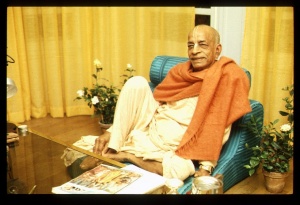SB 7.13.14: Difference between revisions
m (1 revision(s)) |
(Vanibot #0054 edit - transform synonyms into clickable links, which search similar occurrences) |
||
| (One intermediate revision by one other user not shown) | |||
| Line 1: | Line 1: | ||
{{info | {{info | ||
|speaker= | |speaker=Nārada Muni | ||
|listener=King | |listener=King Yudhiṣṭhira | ||
}} | }} | ||
[[Category:Srimad-Bhagavatam - Canto 07 Chapter 13]] | |||
[[Category:Bhagavatam Verses Spoken by Narada Muni - Vanisource|071314]] | |||
<div style="float:left">'''[[Srimad-Bhagavatam]] - [[SB 7|Seventh Canto]] - [[SB 7.13: The Behavior of a Perfect Person|Chapter 13: The Behavior of a Perfect Person]]'''</div> | |||
<div style="float:right">[[File:Go-previous.png|link=SB 7.13.12-13]] '''[[SB 7.13.12-13]] - [[SB 7.13.15]]''' [[File:Go-next.png|link=SB 7.13.15]]</div> | |||
{{RandomImage}} | |||
==== TEXT 14 ==== | ==== TEXT 14 ==== | ||
<div | <div class="verse"> | ||
karmaṇākṛtibhir vācā | :karmaṇākṛtibhir vācā | ||
liṅgair varṇāśramādibhiḥ | :liṅgair varṇāśramādibhiḥ | ||
na vidanti janā yaṁ vai | :na vidanti janā yaṁ vai | ||
so 'sāv iti na veti ca | :so 'sāv iti na veti ca | ||
</div> | </div> | ||
| Line 17: | Line 22: | ||
==== SYNONYMS ==== | ==== SYNONYMS ==== | ||
<div | <div class="synonyms"> | ||
''[//vanipedia.org/wiki/Special:VaniSearch?s=karmaṇā&tab=syno_o&ds=1 karmaṇā]'' — by activities; ''[//vanipedia.org/wiki/Special:VaniSearch?s=ākṛtibhiḥ&tab=syno_o&ds=1 ākṛtibhiḥ]'' — by bodily features; ''[//vanipedia.org/wiki/Special:VaniSearch?s=vācā&tab=syno_o&ds=1 vācā]'' — by words; ''[//vanipedia.org/wiki/Special:VaniSearch?s=liṅgaiḥ&tab=syno_o&ds=1 liṅgaiḥ]'' — by symptoms; ''[//vanipedia.org/wiki/Special:VaniSearch?s=varṇa&tab=syno_o&ds=1 varṇa]-[//vanipedia.org/wiki/Special:VaniSearch?s=āśrama&tab=syno_o&ds=1 āśrama]'' — pertaining to the particular material and spiritual divisions of varṇa and āśrama; ''[//vanipedia.org/wiki/Special:VaniSearch?s=ādibhiḥ&tab=syno_o&ds=1 ādibhiḥ]'' — and by other symptoms; ''[//vanipedia.org/wiki/Special:VaniSearch?s=na&tab=syno_o&ds=1 na] [//vanipedia.org/wiki/Special:VaniSearch?s=vidanti&tab=syno_o&ds=1 vidanti]'' — could not understand; ''[//vanipedia.org/wiki/Special:VaniSearch?s=janāḥ&tab=syno_o&ds=1 janāḥ]'' — people in general; ''[//vanipedia.org/wiki/Special:VaniSearch?s=yam&tab=syno_o&ds=1 yam]'' — whom; ''[//vanipedia.org/wiki/Special:VaniSearch?s=vai&tab=syno_o&ds=1 vai]'' — indeed; ''[//vanipedia.org/wiki/Special:VaniSearch?s=saḥ&tab=syno_o&ds=1 saḥ]'' — whether that person; ''[//vanipedia.org/wiki/Special:VaniSearch?s=asau&tab=syno_o&ds=1 asau]'' — was the same person; ''[//vanipedia.org/wiki/Special:VaniSearch?s=iti&tab=syno_o&ds=1 iti]'' — thus; ''[//vanipedia.org/wiki/Special:VaniSearch?s=na&tab=syno_o&ds=1 na]'' — not; ''[//vanipedia.org/wiki/Special:VaniSearch?s=vā&tab=syno_o&ds=1 vā]'' — or; ''[//vanipedia.org/wiki/Special:VaniSearch?s=iti&tab=syno_o&ds=1 iti]'' — thus; ''[//vanipedia.org/wiki/Special:VaniSearch?s=ca&tab=syno_o&ds=1 ca]'' — also. | |||
</div> | </div> | ||
| Line 24: | Line 29: | ||
==== TRANSLATION ==== | ==== TRANSLATION ==== | ||
<div | <div class="translation"> | ||
Neither by that saintly person's activities, by his bodily features, by his words nor by the symptoms of his varṇāśrama status could people understand whether he was the same person they had known. | Neither by that saintly person's activities, by his bodily features, by his words nor by the symptoms of his varṇāśrama status could people understand whether he was the same person they had known. | ||
</div> | </div> | ||
| Line 31: | Line 36: | ||
==== PURPORT ==== | ==== PURPORT ==== | ||
<div | <div class="purport"> | ||
The inhabitants of that particular place on the bank of the Kāverī in the valley of the mountain known as Sahya were unable to understand whether that saint was the same man they had known. It is therefore said, vaiṣṇavera kriyā mudrā vijñe nā bhujhaya. A highly advanced Vaiṣṇava lives in such a way that no one can understand what he is or what he was. Nor should attempts be made to understand the past of a Vaiṣṇava. Without asking the saintly person about his previous life, Prahlāda Mahārāja immediately offered him respectful obeisances. | The inhabitants of that particular place on the bank of the Kāverī in the valley of the mountain known as Sahya were unable to understand whether that saint was the same man they had known. It is therefore said, ''vaiṣṇavera kriyā mudrā vijñe nā bhujhaya''. A highly advanced Vaiṣṇava lives in such a way that no one can understand what he is or what he was. Nor should attempts be made to understand the past of a Vaiṣṇava. Without asking the saintly person about his previous life, Prahlāda Mahārāja immediately offered him respectful obeisances. | ||
</div> | </div> | ||
__NOTOC__ | |||
<div style="float:right; clear:both;">[[File:Go-previous.png|link=SB 7.13.12-13]] '''[[SB 7.13.12-13]] - [[SB 7.13.15]]''' [[File:Go-next.png|link=SB 7.13.15]]</div> | |||
__NOTOC__ | |||
__NOEDITSECTION__ | |||
Latest revision as of 22:53, 18 February 2024

A.C. Bhaktivedanta Swami Prabhupada
TEXT 14
- karmaṇākṛtibhir vācā
- liṅgair varṇāśramādibhiḥ
- na vidanti janā yaṁ vai
- so 'sāv iti na veti ca
SYNONYMS
karmaṇā — by activities; ākṛtibhiḥ — by bodily features; vācā — by words; liṅgaiḥ — by symptoms; varṇa-āśrama — pertaining to the particular material and spiritual divisions of varṇa and āśrama; ādibhiḥ — and by other symptoms; na vidanti — could not understand; janāḥ — people in general; yam — whom; vai — indeed; saḥ — whether that person; asau — was the same person; iti — thus; na — not; vā — or; iti — thus; ca — also.
TRANSLATION
Neither by that saintly person's activities, by his bodily features, by his words nor by the symptoms of his varṇāśrama status could people understand whether he was the same person they had known.
PURPORT
The inhabitants of that particular place on the bank of the Kāverī in the valley of the mountain known as Sahya were unable to understand whether that saint was the same man they had known. It is therefore said, vaiṣṇavera kriyā mudrā vijñe nā bhujhaya. A highly advanced Vaiṣṇava lives in such a way that no one can understand what he is or what he was. Nor should attempts be made to understand the past of a Vaiṣṇava. Without asking the saintly person about his previous life, Prahlāda Mahārāja immediately offered him respectful obeisances.